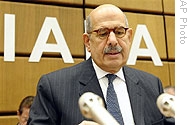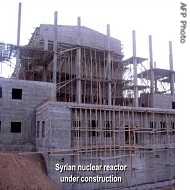voa标准英语2008年-IAEA Frustrated Over Lack of Transparency in Ir(在线收听)
 |
| IAEA Director General, Mohamed ElBaradei, is seen before the IAEA's board meeting in Vienna, 27 Nov 2008 |
The International Atomic Energy Agency is holding a two-day meeting to examine reports on the alleged nuclear activities of Iran and Syria, both of which has sparked international concern. In comments before the commission on Thursday, agency chief Mohammed ElBaradei said neither country had done enough to assuage concerns about their programs.
He urged Iran to clarify a number of issues about its nuclear program and to stop obstructing an IAEA probe into intelligence materials that the United States says shows the country studied how to design atomic bombs.
"There remain a number of outstanding issues, relevant to the alleged studies and associated questions identified in my last report to the board which give rise to concern and need to be clarified in order to exclude the existence of a possible military dimension to Iran's nuclear program. Regrettably, the agency has not been able to make substantive progress on these issues," he said.
Western nations fear Iran is trying to build a nuclear bomb. But Tehran insists the purpose of its nuclear enrichment program is to make energy.
 |
| This undated image released during a briefing by senior US officials shows alleged Syrian nuclear reactor built with North Korean help, which was hit by Israeli strike |
ElBaradei said also Syria has failed to clear suspicion that a desert site bombed by Israel last year was a nuclear reactor.
"As I stated in the report, while it cannot be excluded that the building in question was intended for non-nuclear use, the features of the building, along with the availability of adequate pumping capacity of cooling water, are similar to what may be found in connection with a reactor site," he said. In light of this, it is important that Syria provide the agency with documentation in support of its statements concerning the nature and function of the destroyed building."
In remarks to reporters earlier this week, the head of Syria's atomic energy commission ruled out follow-up visits to the site by IAEA experts. The IAEA's board has nonetheless approved a Syrian demand for technical assistance in planning a civilian nuclear power plant over U.S. objections.